We have to feel it to heal it! Emotions we bury eat at us—insidiously eroding our health, wellness, and relationships. Becoming a heavy weight passed down through our parenting, unexpressed emotions + unhealthy coping can profoundly impact future generations.
Below are fifteen quotes on generational patterns, trauma, and the journey to emotional healing.
Quotes Exploring the Path to Emotional Healing
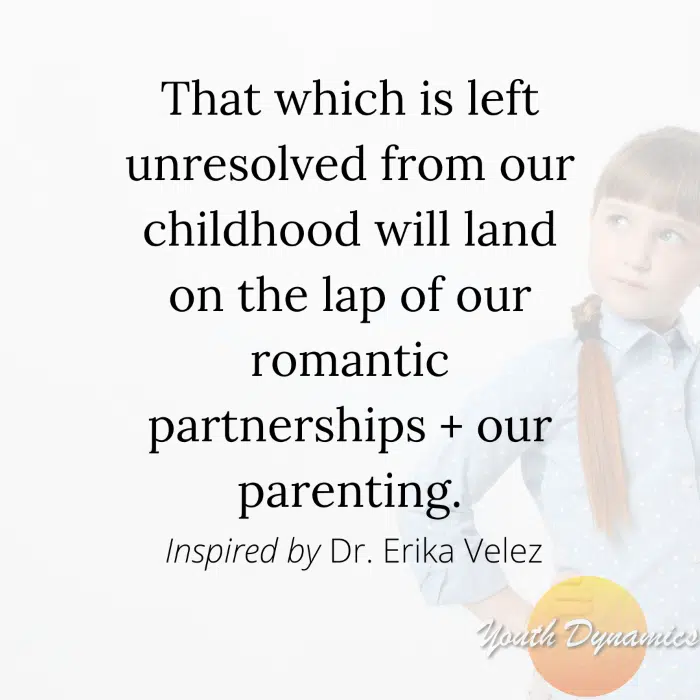
Quote 1: That which is left unresolved from our childhood will land on the lap of our romantic partnerships + our parenting. – Inspired by Dr. Erika Velez
What remains unsettled within us finds its way into our parenting and relationships. Through self-awareness and compassion, we can break free from the patterns that no longer serve us. By nurturing our emotional well-being, we pave the way for a brighter, more connected future.
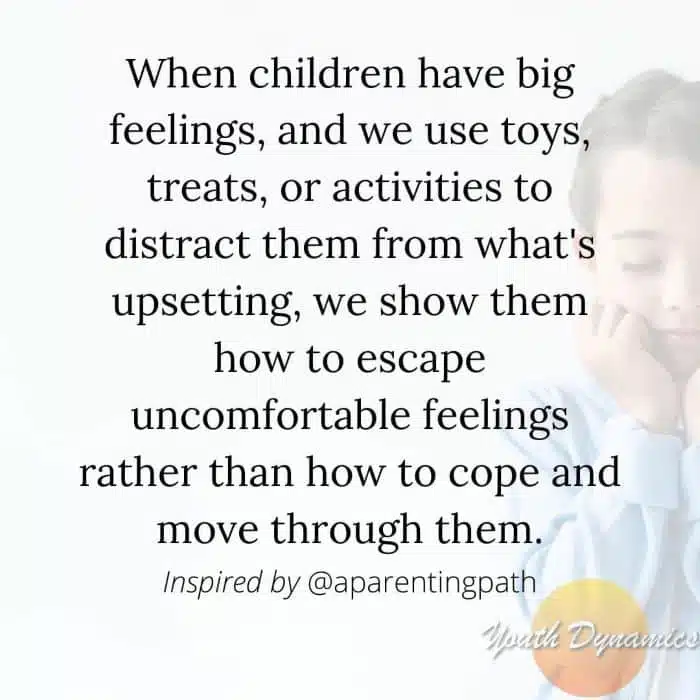
Quote 2: When children have big feelings, and we use toys, treats, or activities to distract them from what’s upsetting, we show them how to escape uncomfortable feelings rather than how to cope and move through them. – @aparentingpath
When children experience big emotions, it can be tempting to resort to toys, treats, or activities as a quick fix to help them feel better. But when we choose this path, we unintentionally teach them to evade rather than confront their discomfort.
Instead, embrace the opportunity to teach kids how to sit with and process their emotions. By holding space, validating feelings, and gently guiding children through challenging moments, we equip them with the tools to cope, grow, and thrive.

Quote 3: Addiction begins with the hope that something “out there” can instantly fill the emptiness inside. – Jean Kilbourne
Addiction is often born from a pattern of seeking external comforts to escape internal discomfort. When we distract kids from their feelings, we unintentionally teach them to avoid or suppress their emotions rather than develop healthy coping mechanisms to navigate through them.
Early patterns of seeking instant relief set the stage for addiction as we learn to seek external sources to fill our inner void. We must teach kids how to recognize, express, and process their emotions, providing them with the tools to cope, heal, and build resilience in facing life’s challenges.

Quote 4: If we never let children go through the full wave of emotions when the emotion hits, there won’t be the assurance that it will pass. That is scary. – Krysten Taprell
Emotions are like waves, rising and falling in intensity. We must allow kids to experience the entire spectrum of the waters.
If we shield them from the waves, they may not grasp the temporary nature of emotions—which, for a child, can be scary. But when we courageously guide them through the storm, we assure them that feelings pass, bringing strength and comfort.

Quote 5: Numbing is a very human defense mechanism. It is a disconnect to protect ourselves from what has been emotionally and relationally too vulnerable, overwhelming, hurtful, or unsafe. – Inspired by Lelia Schott
Numbing acts as a disconnect, offering temporary respite from the intensity of our emotions—but while momentarily comforting, it prevents healing.
We must allow ourselves to experience emotions, embracing our discomfort with courage and compassion. By facing our vulnerabilities head-on, we create space for healing and lay the path to resilience.
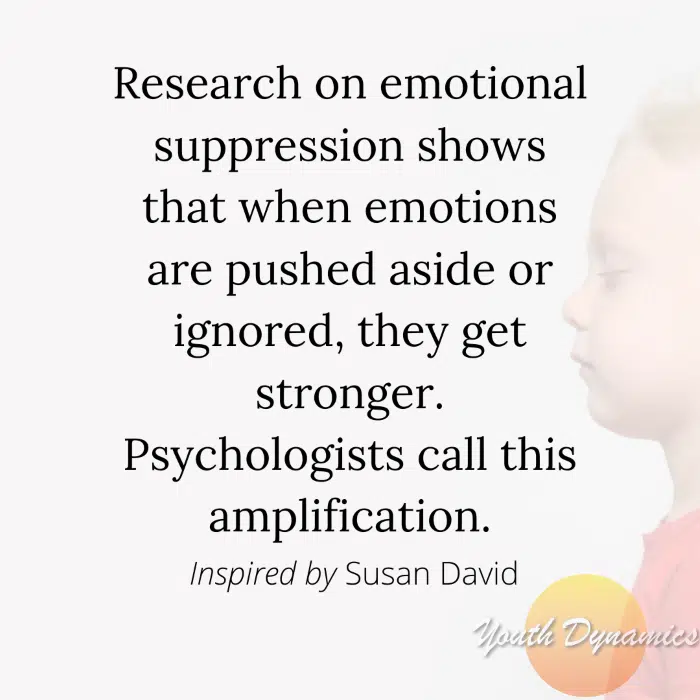
Quote 6: Research on emotional suppression shows that when emotions are pushed aside or ignored, they get stronger. Psychologists call this amplification. – Inspired by Susan David
We have to feel it to heal it. By embracing our emotions, we open the door to self-regulation—cultivating greater self-awareness, healthier responses to others, and a more balanced journey.

Quote 7: Yes, your emotions are valid, but that is not permission to react to those emotions in any way you feel like it. We are all connected, and words and actions are impactful, so use them responsibly. – Inspired by Dr. Caroline Leaf
Yes, our emotions are valid, and it’s important to honor and acknowledge them. But it’s equally essential to recognize that our emotions don’t permit us to react without considering the impact on others.
Our words and actions hold power. Even in the face of intense emotions, we have the capacity to respond thoughtfully. We can choose words that heal rather than harm—actions that uplift rather than tear down.

Quote 8: A lot of our explosive emotional reactions aren’t actually a response to the present moment. They’re a build-up of all the times we were in a similar dynamic and did not stand up for ourselves, use our voices, or express our emotions. – @haileypaigemagee
Our emotional reactions often trace back to unresolved echoes of our past, reverberating through our present experiences. By acknowledging our feelings, we grant ourselves the space to understand their origins—unraveling the threads of past experiences that continue to weave into our present reactions.
As we cultivate a deeper understanding, we unlock the power of healthier responses to others, fostering empathy and compassion in our connections.
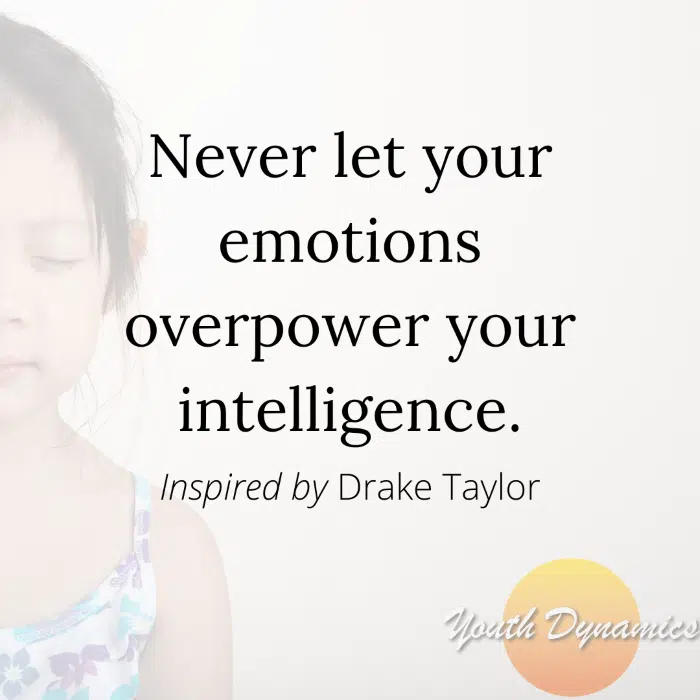
Quote 9: Never let your emotions overpower your intelligence. – Drake Taylor
Have you heard of the term “emotional hijacking?” It refers to a sudden and intense emotional response that bypasses our ability to process situations logically.
Our amygdala, the part of the brain responsible for processing emotions and triggering the fight-or-flight response, takes over the rational thinking processes of the prefrontal cortex, resulting in impulsive behaviors, exaggerated emotional reactions, and difficulty in making sound decisions.
It can occur in response to perceived threats, stressful events, or triggers of traumatic experiences, leading to outbursts of anger, fear, or sadness that may be disproportionate to a situation.
Recognizing when emotional hijacking is taking place is essential to responding effectively. Techniques like deep breathing, mindfulness, and taking a step back to assess can help us regain control over our emotions and allow for more thoughtful responses.
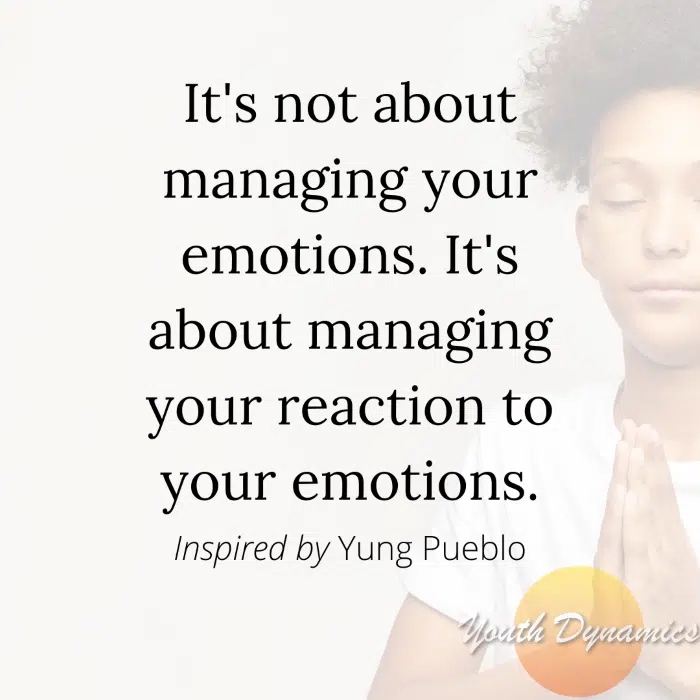
Quote 10: It’s not about managing your emotions. It’s about managing your reaction to your emotions. – Inspired by Yung Pueblo
Emotional intelligence is not just about controlling our emotions but leveraging them as a source of strength. More than managing our feelings, it’s empowering ourselves to manage our reactions to them effectively.
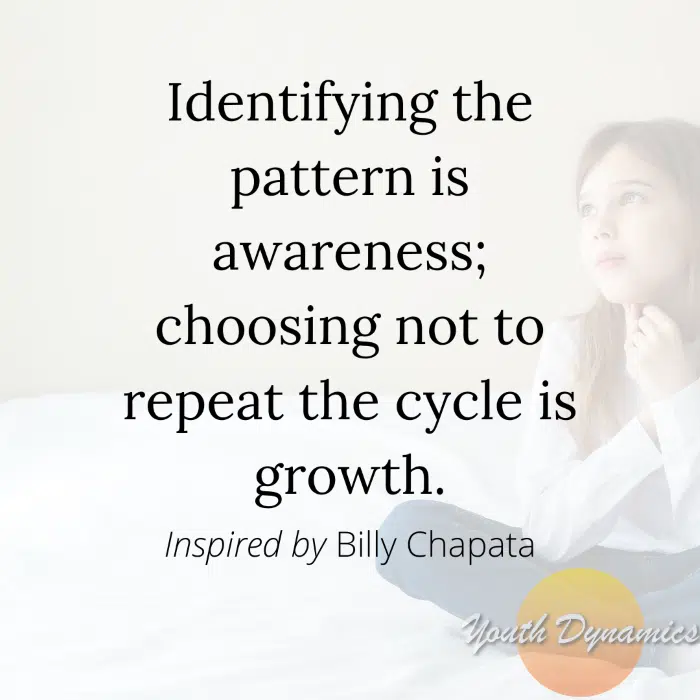
Quote 11: Identifying the pattern is awareness; choosing not to repeat the cycle is growth. – Billy Chapata
Growth starts when we consciously decide not to perpetuate old cycles—a journey that begins with self-awareness. By identifying patterns woven into our interactions and tuning into our emotions, we can understand ourselves and others more profoundly.
Once we start this trek, we’re better able to respond intentionally to those in our lives rather than simply reacting—a transformative step towards greater well-being and more harmonious relationships.

Quote 12: We cannot be more connected to others than we are to ourselves. – Brene Brown
True connection to others begins with cultivating a deep connection to ourselves. Through self-discovery, self-acceptance, and self-compassion, we create the foundation for meaningful and authentic relationships.
When we prioritize nurturing our own well-being, we unlock the capacity to understand and empathize with others on a more profound level. By tending to our own emotional landscape, we gain the tools to navigate the intricate terrain of human connection.
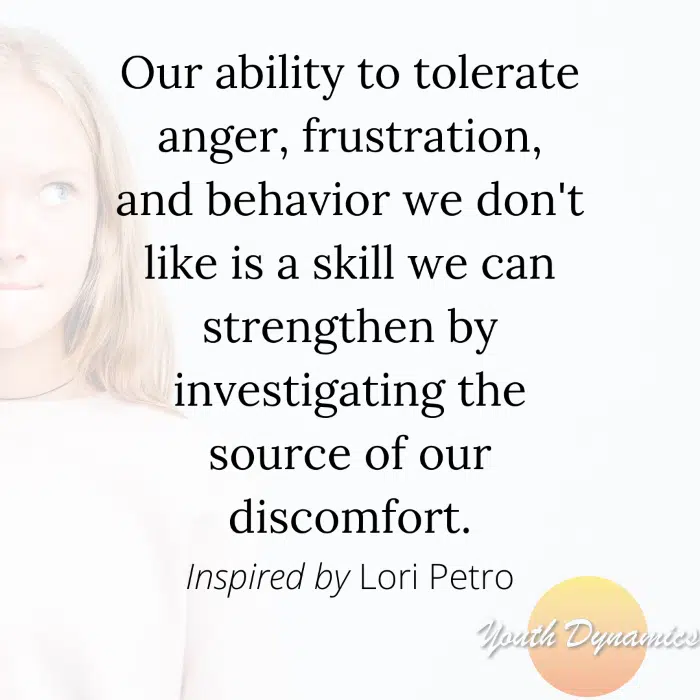
Quote 13: Our ability to tolerate anger, frustration, and behavior we don’t like is a skill we can strengthen by investigating the source of our discomfort. – Lori Petro
We can’t meet others more deeply than we’ve met ourselves.
By delving into the root causes of our discomfort, we open the door to strengthening our emotional resilience. As we gain insight into our triggers and patterns, we empower ourselves to respond with empathy and understanding to others.
Remember, our capacity to navigate anger, frustration, and behaviors that challenge us is a skill we can hone. Through self-reflection and curiosity, we expand our ability to tolerate + hold space for others, fostering healthier relationships.
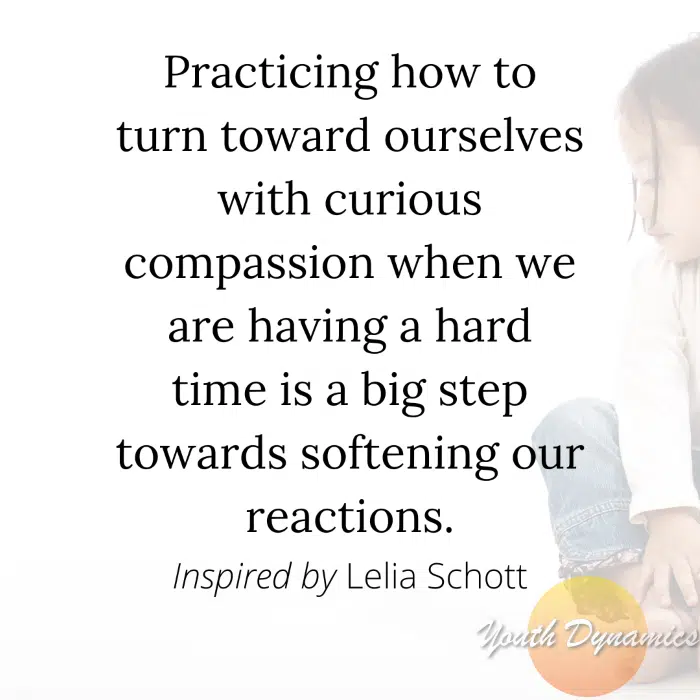
Quote 14: Practicing how to turn toward ourselves with curious compassion when we are having a hard time is a big step towards softening our reactions. – Lelia Schott
In challenging moments when emotions are high and patience is low, we can respond instead of react.
By cultivating the ability to pause and tune into our emotions, we create space for understanding and acceptance. When we extend compassion to ourselves, we open the door to softer, more empathetic responses to others.
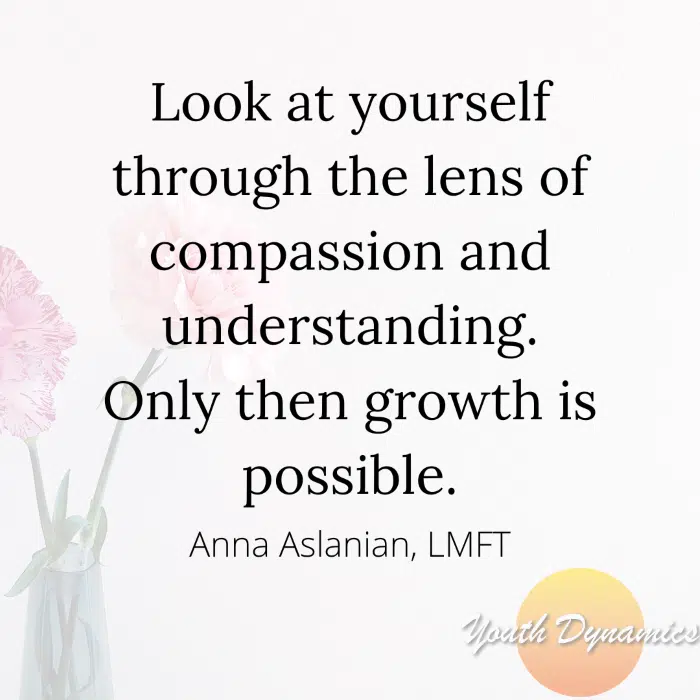
Quote 15: Look at yourself through the lens of compassion and understanding. Only then growth is possible. – Anna Aslanian, LMFT
Self-awareness is a powerful tool that allows us to evolve and thrive—both personally and professionally. By looking at ourselves through a lens of compassion, we open the door to endless opportunities for growth.
Want More?
Check out the rest of our blog and follow us on social media. You can find us on LinkedIn at Youth Dynamics of Montana, Instagram @youthdynamicsmt, and Facebook at Youth Dynamics of Montana & People of Youth Dynamics.



